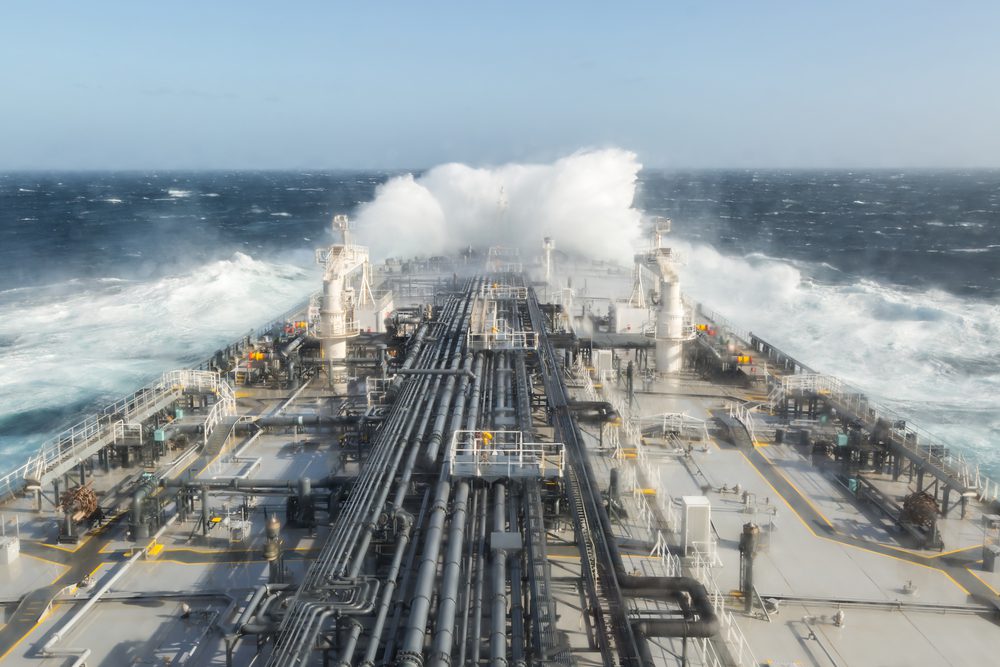By Anatoly Menzhiliy / Shutterstock
By Liam Denning (Bloomberg Opinion) –“It is not the role of the United States to take the lead in protecting neutral shipping in the [Persian] Gulf.”
That was George Shultz, President Ronald Reagan’s Secretary of State, arguing in early 1987 against granting a request from Kuwait to reflag its oil tankers as American and gain protection from Iran during the so-called “Tanker War.” Shultz didn’t prevail. The reflagging and U.S. Navy convoy operation known as Earnest Will kicked off within months.
Tensions in the Persian Gulf are high once again; the latest incident involves an unmanned drone being shot down. Earlier this week, Air Force General Paul Selva, the vice chairman of the Joint Chiefs of Staff, said something to a group of reporters gathered in Washington that echoed Shultz, as reported in Defense News:
… in the Strait of Hormuz and the Gulf, we’ve taken on an international responsibility of ensuring freedom of navigation and the movement of oil in and out of the Gulf. That doesn’t mean it’s a U.S.-only problem. If we take this on as a U.S.-only responsibility, nations that benefit from that movement of oil through the Persian Gulf are bearing little or no responsibility for the economic benefit they gain from the movement of that oil.
Selva’s position will prove more enduring.
Oil is the big variable, though not the only one and not in a straightforward way. Speaking with Time in an interview published Tuesday, President Donald Trump noted that while other countries “get such vast amounts of oil” from the Middle East, the U.S. gets “very little.” Selva concurred, saying “we are not wholly dependent on the movement of Saudi, Kuwaiti, Qatari and Emirati oil in and out of the Gulf to sustain our economy.”
As it happens, the U.S. took more imports of oil from the Persian Gulf in 2018 than it did in 1987 or, indeed, most of the 1980s, both in absolute terms and as a share of imports and consumption.
What has changed, and in dramatic fashion, is America’s relationship with the global oil trade in general.
The shale boom has transformed Washington’s attitude toward energy. Far from fretting about being “addicted to oil,” as President George W. Bush put it in 2006, the Trump administration sees America leapfrogging the old obsession with energy independence straight to the dream of “energy dominance.” Exported liquefied natural gas is now dubbed “molecules of U.S. freedom,” and the rebranding of star-spangled coal as “lumps of liberty” surely cannot be far off.
Even if the reality is that the U.S. remains energy interdependent – it still imports about 9 million barrels of oil a day, gross – such nuances tend to get lost when America just notched up the biggest annual increase in production for any country ever and net imports are headed to zero.
Changes in the wider geopolitical context also matter. Operation Earnest Will was all about escorting oil tankers. But it had just as much to do with blocking Soviet influence in the region as well as restoring credibility after Reagan’s Iran-Contra scandal. Plus, besides its own requirements, the U.S. had to consider the needs of Cold War allies in Europe and Asia dependent on Middle Eastern barrels.
Today, the game has changed in all respects. The White House appears more concerned with Tehran as a direct threat rather than just an adjunct or target of Moscow. Allies, even in NATO, find themselves threatened with sanctions. Shale oil may provide an important tool, but there is a broader shift occurring in Washington’s attitudes to the rest of the planet. As I wrote here a couple of years ago, the free-trading, freely navigable world order that has held more or less since 1945 – coinciding with oil’s ascent to energy preeminence – is losing its chief sponsor.
Selva observed that the bulk of oil from the Persian Gulf now heads to Asia, and that “none of those countries have shown any predilection to pressing Iran to stop what they are doing.” The numbers bear him out. It is the Far East that now relies overwhelmingly on oil from the Middle East.
Besides the old certainties around ever-increasing oil demand being called into question by climate change, the other underpinnings of free trade and, entwined with that, U.S. military muscle to back it up can no longer be taken for granted. Washington appears to be finally coming around to Shultz’s view, albeit in circumstances that would have seemed inconceivable to him back then.
© 2019 Bloomberg L.P

 Join The Club
Join The Club











